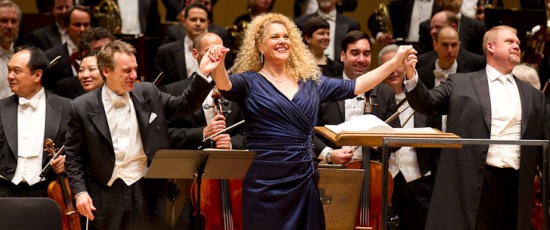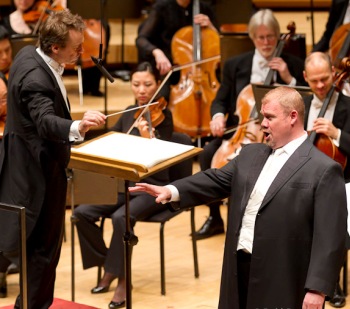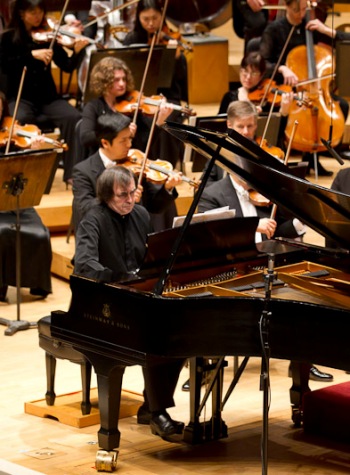In a bold CSO debut, English conductor meets twin challenges of Mahler and Schoenberg
 Review: Chicago Symphony Orchestra conducted by Jonathan Nott; Pierre-Laurent Aimard, piano. At Orchestra Hall through March 3. ****
Review: Chicago Symphony Orchestra conducted by Jonathan Nott; Pierre-Laurent Aimard, piano. At Orchestra Hall through March 3. ****
By Lawrence B. Johnson
Stepping in to pinch hit for Pierre Boulez may not be the least stressful way to make one’s conducting debut with the Chicago Symphony Orchestra. Subbing on short notice to take over Boulez’s rare pairing of Mahler’s song-symphony “Das Lied von der Erde” and Schoenberg’s Piano Concerto – that’s quite a debut.
 Hat’s off, then, to English conductor Jonathan Nott, who made a doubly convincing first impression March 1 as collaborator with pianist Pierre-Laurent Aimard in the Schoenberg Concerto and as an authoritative and sympathetic conductor of Mahler.
Hat’s off, then, to English conductor Jonathan Nott, who made a doubly convincing first impression March 1 as collaborator with pianist Pierre-Laurent Aimard in the Schoenberg Concerto and as an authoritative and sympathetic conductor of Mahler.
Nott, 49, principal conductor of the Bamberg Symphony Orchestra since 2000, earned his conducting stripes with German orchestras. Indicative of his range are several recordings of works by Gyorgy Ligeti with the Berlin Philharmonic, a stint as music director of the Ensemble InterContemporain in Paris – he remains its principal guest conductor – and a series of Mahler symphony recordings with his Bamberg orchestra.
The formidable pairing of Schoenberg and Mahler seemed custom-tailored for Nott. His eloquent turn through “Das Lied von der Erde,” with mezzo-soprano Michelle DeYoung and tenor Stuart Skelton, probed deeply into the work’s world-weariness. Nott summoned a breathtaking view of Mahler’s orchestral palette, harmonic vibrancy and inextinguishable passion.
 “Das Lied von der Erde” – the Song of the Earth – consists of six symphonic settings of ancient Chinese poems on the vagaries of life: its youthful hope, its cup of sorrow, its beauty and its loneliness. The cycle begins with a lusty drinking song of despair and ends with an exquisite ode of farewell to life’s trials and iniquities.
“Das Lied von der Erde” – the Song of the Earth – consists of six symphonic settings of ancient Chinese poems on the vagaries of life: its youthful hope, its cup of sorrow, its beauty and its loneliness. The cycle begins with a lusty drinking song of despair and ends with an exquisite ode of farewell to life’s trials and iniquities.
Mahler habitually revised his works after their premieres, so it’s quite significant that the ailing composer died without ever hearing “Das Lied von der Erde” or the similarly valedictory Ninth Symphony that followed. If there can be little doubt he would have made alterations, it’s hard to argue that “Das Lied” is not Mahler’s consummate masterpiece, so completely does it sum up both his mystical world view and his creative genius.
That craftsmanship, both symphonic and vocal, was on full display in this performance. In the solo tenor role, Skelton brought ruddy, even heroic strength to songs of drunken defiance, rising to meet the orchestra voice for collective voice. Yet he also touched the lyric heart of becalmed verses on manly youth in repose. DeYoung’s quiescent evocation of autumnal loneliness — and her joyous singing about an aloof girl whose head is turned by a dashing lad on horseback – were mere prelude to her finely etched “Farewell,” the cycle’s expansive and transcendent conclusion. The mezzo imbued Mahler’s long, fragile line with a tenderness and sparkle that carried thought and listener on the same upward path.
Nott shaped song upon song with an unfailing sense of poetic phrase, earthly passion and rhythmic spring. The orchestra’s gorgeous playing extended from a profusion of woodwind solos to strings that underpinned the “Farewell” barely at the threshold of audibility. Despite moments when Nott allowed the full splendor of Mahler’s orchestration to cover the singers, the conductor’s indulgence allowed the CSO to lavish its best on a composer whose music has long since been fundamental to its identity.
 Schoenberg’s 1942 Piano Concerto, in the fluent hands of Aimard, was an ear-opening treat. It’s remarkable how, at the distance of 70 years, the concerto’s opening registers an unmistakable link to Brahms. Although this single-movement work of 20 minutes’ duration quickly affirms its serialist authorship, it also reflects to the end Schoenberg’s conscious aim to reconnect his music with the Austro-German tradition.
Schoenberg’s 1942 Piano Concerto, in the fluent hands of Aimard, was an ear-opening treat. It’s remarkable how, at the distance of 70 years, the concerto’s opening registers an unmistakable link to Brahms. Although this single-movement work of 20 minutes’ duration quickly affirms its serialist authorship, it also reflects to the end Schoenberg’s conscious aim to reconnect his music with the Austro-German tradition.
Aimard made the quasi-Romantic piece sing as well as surge, connecting its often far-flung dots with an engaging ease and natural flow. The slow movement bore a genuine emotional resonance, shadowy and linear, and the finale exploded with virtuoso fireworks that belied the anti-Romantic pitch of Schoenberg’s style. Nott and the CSO supported and interacted with a purpose, clarity and flair that matched the pianist’s.
Related Links:
- Remaining performances: Ticket info
- “Why We’re Still Afraid of Schoenberg”: Read Norman Lebrecht’s essay
Photo captions and credits: Home page and top: From left, conductor Jonathan Nott, mezzo-soprano Michelle DeYoung and tenor Stuart Skelton take their bows after performing Mahler’s “Das Lied von der Erde.” Upper right: Conductor Jonathan Nott and tenor Stuart Skelton. Upper left: Mezzo-soprano Michelle DeYoung and conductor Jonathan Nott. Lower left: pianist Pierre-Laurent Aimard. (Photos by Todd Rosenberg)
Tags: Chicago Symphony Orchestra, Jonathan Nott, Mahler, Michelle DeYoung, Pierre-Laurent Aimard, Schoenberg, Stuart Skelton

